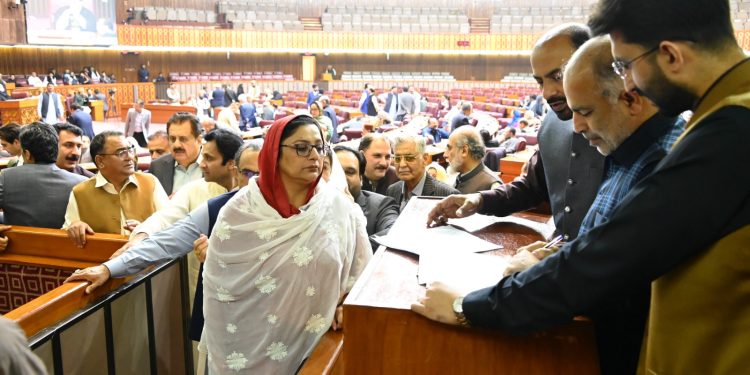ISLAMABAD: The government secured 225 votes, exceeding the required 224, with support from a group of independent MNAs, including members of the Pakistan Tehreek-e-Insaf (PTI), for the passage of the 26th Constitutional Amendment, 2024 Bill, in the National Assembly.
As per report from a private TV channel, Zahoor Qureshi, Aurangzeb Khichi, Usman Ali, and Mubarak Zeb were the PTI-backed independent MNAs who voted in favor of the amendment, while Chaudhry Ilyas of the Pakistan Muslim League-Quaid (PML-Q) also supported the legislation.
The chief justice of Pakistan will be selected by a parliamentary committee after the president’s assent and will serve a fixed term of three years under the judicial reforms approved during the late-night session of parliament. Additionally, a new constitutional bench will also be established.
Upon the recommendation of the parliamentary committee, the prime minister will forward the name of the chief justice to the president. If a judge declines, the name of the next senior judge will be taken into consideration.
Read More: Federal cabinet gives green light to 26th constitutional amendment
In response to the PTI MNAs’ support for the government’s move, former ruling party senior leader Asad Qaiser stated on Monday that the PTI-backed independent candidates who supported the controversial constitutional amendment betrayed the party and its founder, Imran Khan.
“Those who voted [in favor of the bill] have committed treachery against the party and its founder,” Qaiser said during a media talk.
Emphasizing that the votes cast did not align with party policy, Qaiser, a former speaker of the lower house, stated: “These were not their votes; they were votes for the founder of PTI.”
Furthermore, he cautioned that legal action would be taken against those who displayed disloyalty to the party.
Highlights of the 26th Amendment, 2024 Bill:
- Chief justice’s tenure fixed at three years.
- Constitutional benches to be established at the Supreme Court and high courts.
- Senior-most judge of each bench to serve as presiding officer.
- Parliamentary committee to nominate the new Chief Justice of Pakistan from a panel of the three most senior judges.
- Committee to propose a name to the Prime Minister, who will then forward it to the president for final approval.
- JCP to monitor judges’ performance and report any concerns to the Supreme Judicial Council.
- Judicial Commission of Pakistan (JCP), led by the Chief Justice of Pakistan and three others, responsible for the appointment of Supreme Court judges.
- Complete eradication of Riba (interest) from the country by January 1, 2028.











